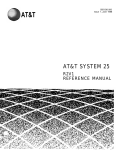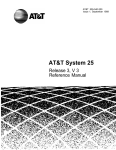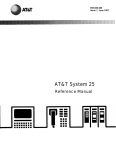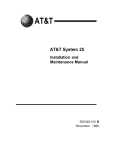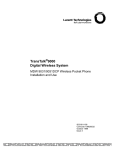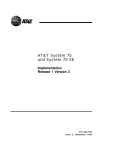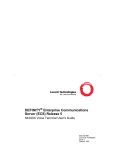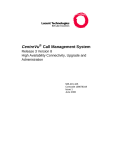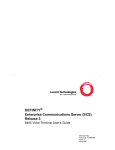Download AT&T Merlin 1030 User`s guide
Transcript
AT&T MDW 9000 Wireless Telephone Quick Reference Contents 1 Handset Controls Handset Display Line Status Indicators Call Alerter Charging Cradle Controls Troubleshooting Wireless Test Mode MDW 9000 Compatibility 2 2 2 3 4-9 10-11 12-17 Remember to press the [ On/Off ] button to turn on your wireless phone before pressing any other button. Help! If you need assistance when using your wireless phone with a PARTNER, MERLIN, or MERLIN LEGEND system in the continental U.S., call 1 800 628-2888. For all other systems, follow the procedure you normally use to get support for your communications system. Outside the continental U.S., contact your AT&T Representative or local Authorized Dealer. AT&T Handset Controls Antenna Headset On/Off Button Press to turn the headset on. ON appears in handset display. To turn off, press again. Turn on to make or answer a call, and turn off to “hang up.” Battery Charging Contacts Handset battery charges through these contacts. Handset Display Displays status of lines and range. For detailed description, see “Handset Display” on next page. Outside Line/ Programmable/ Intercom/Drop Buttons (6) Volume Control Press +/- to adjust volume of earpiece or ringer. See “MDW 9000 Compatibility” beginning on page 12 for system button assignments. Mute Hold Press to turn the microphone off for privacy of internal communications. Press to put a call on hold. Feat (Feature) Press to enter programming mode or to use dial-code features. Not used on System 25, System 75, System 85, or DEFINITY® system. On/Off Press to turn the handset on. ON appears in handset display To turn off, press again. Turn on to make or answer a call, and turn off to “hang up.” Trans (Transfer) Press to transfer a call to another extension. Conf (Conference) Press to conference in (add) another party to your call. Extension Label Write the extension number on this label using a pencil or ball-point pen only. Headset Jack Insert headset cord when using headset. 1 Handset Display ➀ 18 indicates Local Test Mode; 1 through 10 are used in ➁ ➂ Wireless Test Mode. P indicates programming mode. MUTE indicates handset microphone is turned off after pressing [ Mute ]. ➃ T indicates handset is in Wireless Test Mode. ➄ MSG indicates a message has been deposited in your voice mailbox. ➅ Line Status Indicators. See below. ➆ BATT indicates low battery voltage, Handset also emits 2 ➇ beeps. See “Troubleshooting” for more information. RANGE indicates handset is out of range or almost out of range. Handset also beeps. See “Troubleshooting” for more information. ➈ ON indicates handset has been turned on after pressing [ On/Off ]. Line Status Indicators There are six line status indicators; each one corresponds to a specific outside line/programmable/intercom/drop button, The indicators show either a triangle or a rectangle, signifying activity as follows: PARTNER Systems Arrow ( ▲ or ▼ ) indicates activity at YOUR extension. Rectangle ( ) indicates activity at ANOTHER extension. All Other Systems Rectangle ( ) indicates activity at YOUR extension. Arrow ( ▲ or ▼ ) indicates activity at ANOTHER extension. Call Alerter If a call comes in while the phone is idle, the handset rings. If you are already on a call, the handset chirps. 2 Charging Cradle Controls AT&T Battery Charging Contacts Handset battery charges through these contacts. Handset Hook Rotate for wall mounting. Spare Battery Compartment Cover Open to insert or remove optional spare battery pack. Charge LED Lights when handset is properly placed in cradle for charging. Ext. 16 Charge Spare Charge Spare Charge LED Lights when spare battery pack is properly placed in cradle's spare battery compartment. Extension Label Write this phone's extension number on this label using a pencil or ball-point pen only. 3 Troubleshooting If you have a problem with your wireless phone, you may be able to solve it by following the procedures listed here. If you cannot resolve a problem using these procedures, call for help as described on the front panel of this Quick Reference. Symptom Possible Causes After plugging the radio module or carrier assembly into an electrical outlet, the radio module’s POWER LED does not light. For single radio module installations only: Possible Solutions ■ Radio module is plugged into an electrical outlet controlled by a switch. ■ Plug the radio module’s power cord into an outlet not controlled by a switch. ■ Radio module’s power cord is not inserted properly. ■ Unplug the radio module’s AC adapter from the electrical outlet. Disconnect then carefully re-insert the power cord into the left side of the radio module. Plug the radio module’s AC adapter back into the electrical outlet. ■ Radio module’s power cord is defective. ■ Call for help.* ■ Call for help.* For carrier assembly installations: ■ After plugging the radio module or carrier assembly into an electrical outlet, the PASS LED does not light. Radio module is inoperable. Radio module or carrier assembly is inoperable. * See front panel of this Quick Reference. 4 Call for help.* Troubleshooting Symptom Possible Causes After pressing [ On/Off ], dial tone iS not heard and handset display does not show anything. ■ Battery is not charged sufficiently. ■ Place handset in charging cradle for 12 hours. Or, if you have a fully charged (14 hours) spare battery, use it to replace the battery in the handset. ■ Handset is out of range of its matching radio module. ■ Move the handset closer to the radio module. ■ Telephone line cord is not plugged into the radio module. ■ Plug the telephone line cord into the radio module. ■ There is no battery in the handset. ■ Insert battery in handset. ■ Battery is not inserted properly in handset. ■ Make sure battery is inserted properly in handset. ■ Battery is not charged sufficiently. ■ Place handset in charging cradle for 12 hours. Or, if you have a fully charged (14 hours) spare battery, use it to replace the battery in the handset. ■ Handset is out of range of its matching radio module. ■ Move the handset closer to the radio module. ■ There is interference from another electrical device (microwave) or metal walls. ■ Remove electrical device causing interference or move handset to another location. After pressing [ On/Off ], dial tone is not heard and the RADIO LED on the radio module does not light. BATT appears in the handset display. Battery requires recharging. Possible Solutions You have 1-2 minutes of talk time left. Either: ■ Complete your call, turn the handset off, and recharge the battery (12 hours). ■ 5 If you have a fully charged (14 hours) spare battery, place your call on Hold. Swap the batteries. Wait 6 to 10 seconds, then turn the handset on and proceed as you would for any call placed on Hold. Troubleshooting Symptom Possible Causes Possible Solutions You can hear the party on the other end, but they cannot hear you. MUTE appears in the handset display. The [ Mute ] button was pressed inadvertently. Press [ Mute ] again to turn off the mute feature. Charge LED on charging cradle does not light when handset is placed in charging cradle. ■ Handset is not seated properly in charging cradle. ■ Make sure handset is seated properly in charging cradle. Also check that there are no obstructions on the handset or charging cradle contacts. Try cleaning contacts with a soft eraser. ■ Charging cradle is plugged into an electrical outlet controlled by a switch. ■ Plug charging cradle power supply into an outlet not controlled by a switch. ■ Handset battery is defective or dead. ■ If you have a fully charged (14 hours) spare battery, use it to replace the battery in the handset. Or, order a new battery. If the Charge LED still does not light, call for help.* ■ Spare battery is not seated properly in charging cradle battery compartment. ■ Make sure spare battery is seated properly in the charging cradle compartment. Also check that there are no obstructions on the battery or charging cradle contacts. Try cleaning contacts with a soft eraser. ■ Spare battery is defective or dead. ■ Swap the spare battery with the handset battery to see if the Spare Charge LED Iights. If it lights, order a new battery to replace the spare. If it does not light, call for help.* Spare Charge LED on charging cradle does not light when spare battery is placed in charging cradle battery compartment. * See-front panel of this Quick Reference. 6 Troubleshooting Possible Solutions Symptom Possible Causes After pressing [ On/Off ], the handset beeps and RANGE shows in the handset display. ■ Handset is out of range of its matching radio module. ■ Move the handset closer to the radio module. ■ An electrical device may be interfering with your communications link. ■ Remove interfering device or power it off, or move handset to another location. No ring on incoming call, RANGE appears in handset display. Handset is out of range of its matching radio module. Move the handset closer to the radio module. While talking and walking, the handset beeps and RANGE flashes in the handset display. You are approaching an out of range condition. Move back towards the handset’s matching radio module until the display stops showing RANGE. While talking and walking, the handset beeps and RANGE flashes in the handset display. You keep walking away from the handset’s matching radio module, the display goes blank, and your call appears to be disconnected. You are out of range of the radio module. YOUR CALL HAS NOT BEEN DISCONNECTED. IT HAS BEEN PLACED ON HOLD. Move back towards the radio module. Press [On/Off ], then proceed as you would for any call placed on Hold. After placing a call on Hold, you walk further away from the handset’s matching radio module. Your handset beeps, the handset display flashes RANGE, and your call appears to be disconnected. You are out of range of the radio module. YOUR CALL HAS NOT BEEN DISCONNECTED. IT IS STILL ON HOLD. Move back towards the radio module. Press [ On/Off ], then proceed as you would for any call placed on Hold. 7 Troubleshooting Symptom Possible Causes Range for calls is lower than expected. There are environmental limitations. Possible Solutions ■ Reinstall the radio module or carrier assembly as high as possible on the wall and away from metal obstructions. ■ Eliminate any possible interfering devices (microwaves) between the radio module or carrier assembly and your handset. ■ Turn off or unplug nearby equipment (computer, modem) to see if it is causing interference. If it is, make sure it is on a different power line or move it further away from the handset, radio module, or carrier assembly. Place the handset in Wireless Test Mode as described on page 10. If the signal strength and voice quality readings are low, look for a newly installed radio device nearby. Remove it or move your handset’s matching radio module. Handset range and voice quality are not as good as they were before. A competing radio device may have been installed in the area. Volume is too low at any setting and there is noise on the line. ■ Handset or radio module may not be working properly. ■ Place the handset in Wireless Test Mode and determine sound clarity as described on page 10. If the dial tone is clear and strong, the handset and radio module are OK. ■ The connection between the radio module or carrier assembly and switch/control unit may not be proper. ■ Check the connection between the radio module or carrier assembly and the switch/control unit. ■ Telephone line may be producing noise. ■ Report line trouble to your local phone company. 8 Troubleshooting Symptom Possible Causes Possible Solutions Handset does not respond to repeated [ On/Off ] button presses. There was a recent occurrence of lightning, or a power failure. ■ Remove battery from handset for 10 seconds, then replace it. ■ Check to see if the radio module or carrier assembly is receiving power. Your business has 2 or more wireless phones installed and all handsets seem to have developed interference problems at the same time. There was a recent occurrence of lightning, or a power failure. Unplug the carrier assembly’s power cord from the electrical outlet. Wait 10 seconds, then reconnect the power cord to the outlet. Your business has 2 or more wireless phones installed and you (a) cannot determine which radio module corresponds to your handset or (b) are confused about which handset is yours. Handsets have been mixed up. Place the handset in Wireless Test Mode and determine the terminal identification number as described on page 11. This is the slot number of the radio module in the carrier assembly that corresponds to the handset, and it is the terminal identification number of the handset. Handset range and/ or voice quality is not as good as expected in multiple carrier assembly installation. ■ Coverage zones of carriers overlap. ■ You moved into the coverage zone of another carrier. You are on a call and you hear radio interference when another call rings. System in Key Mode has all lines set to ring. An incoming call "wakes up" all of the other radio modules at the same time to ring the other phones. 9 ■ Reinstall one of the carriers so the coverage zones do not overlap. ■ Move back towards the handset’s matching radio module. Program some of the wireless phones for Delayed Ring or No Ring. Wireless Test Mode Steps 2 through 5 can be performed in any order, and you can press [ On/Off ] to exit at any time. NOTE: Ignore anything that displays if you press [ 4 ] or [ 5 ] while in Wireless Test Mode. These displays are for AT&T Technicians’ use only. 1. To enter Wireless Test Mode: a. With the handset turned off, press [ 9 ] for at least 5 seconds. b. While still holding [ 9 ], press [ On/Off ]. T appears in the display. You hear 2 beeps, then simulated dial tone. 2. To determine sound clarity, listen to the simulated dial tone as you walk around. A clear, strong tone indicates good sound clarity. 3. To determine signal strength, press [ 1 ]. The display shows a number from 1 to 10. The higher the number the stronger the signal, as shown in the table below: Signal Strength Is Display Number 10 Strong/almost error free 9 Strong/almost error free 8 Strong/almost error free 7 Very good/some errors 6 Very good/some errors 5 Good/more errors 4 Good to Fair/more errors 3 Fair/more errors 2 Near end of range 1 Near end of range/loss of link 10 Wireless Test Mode 4. To determine voice quality, press [ 2 ]. The display shows a number from 1 to 10. The higher the number the better the voice quality, as shown in the table below: Voice Quality Is Display Number 10 Very good 9 Very good 8 Errors, but not noticeable in normal speech 7 Errors, but not noticeable in normal speech 6 Noticeable noise 5 Noticeable noise 4 Noisy but intelligible speech 3 Noisy but intelligible speech 2 Garbled speech 1 Unintelligible speech 5. To determine the terminal identification number, press [ 3 ]. The display shows a number from 1 to 6. This is the handset’s identification number and the carrier assembly slot in which the matching radio module resides. 6. To exit Wireless Test Mode, press [ On/Off ]. 11 MDW 9000 Compatibility Your wireless phone is compatible with the communications systems listed below. To use your phone, follow the programming and call handling instructions that come with your communications system for the specific phone identified below. ® ■ PARTNER systems: the MLC-6 Cordless Telephone; the MDW 9000 is fully compatible with the PARTNER family of communications systems. ® ■ MERLIN , MERLIN Plus, and MERLIN II systems: a 5-button phone. ® ■ MERLIN LEGEND systems: a 10-button ATL set. ■ System 25: a 10-button ATL set. ■ System 75, System 85, and DEFINITY systems*: a 7303s set. Carefully note the functional differences between your wireless phone and the one identified above, as described in the following sections. Entering Station Programming Mode On all PARTNER, MERLIN, and MERLIN LEGEND systems: ■ To enter programming mode, turn on the handset, press [ Intercom ], then press [ Feat ] followed by [ 0 ] [ 0 ]. ■ To exit programming mode, press [ Feat ] followed by [ 0 ] [ 0 ] or turn off the handset. NOTE: The above instructions do not apply on System 25, System 75, System 85, and DEFINlTY systems. On those systems, features are assigned by the system administrator. * For DEFINITY G3V3 systems, you can administer the system for the MDW 9000 telephone (rather than a 7303s set) and follow the user’s instructions in the MDW 9000 Wireless Telephone User’s Guide, order number 555-230-768. 12 MDW 9000 Compatibility Programming System Features PARTNER Systems: ■ PARTNER II and PARTNER Plus system buttons should be assigned as follows; 1, 2, 3, and 4 are line or feature buttons (for a PARTNER system, buttons 1 through 4 are line only): 1 3 2 18 PMUTE ON MSG RANGE BATT 4 MERLIN Systems: ■ It is recommended that you use MERLIN 206/410/820 systems installed with Feature Package 2 with your wireless phone. ■ On MERLIN II and MERLIN LEGEND systems, you must connect your wireless phone to an available jack on either a 408 outside line/analog telephone module or a 008 analog . telephone module. ■ You must disable the Voice Announce feature. This phone does not have a speaker function. ■ The wireless phone should not be assigned to a paging group. ■ To program the Ringing Option feature, use the “arrow” and “rectangle” indicators in the display as the equivalent of red and green LEDs, respectively. ■ For MERLIN II system users, if you program an Auto Intercom button, idle line preference must be set to intercom. ■ If any of your incoming lines has the call waiting feature, program the Recall feature on one of the programmable buttons and press it before you pick up a waiting call. You can dial #50 before you pick up a waiting call on the follow ing: MERLIN 206/410/820 systems only with Feature Package 2, and all MERLIN Plus, MERLIN II and MERLIN 1030/3070 systems. Pressing [ On/Off ] will disconnect the call. 13 MDW 9000 Compatibility ■ MERLIN 206/410/820 and MERLIN Plus system buttons should be assigned as follows; 2, 3, 4, and 5 are line or feature buttons: 5 4 3 18 PMUTE ON MSG RANGE BATT 2 To use MERLIN LEGEND system feature codes with this phone, program the top right-hand button as a System Feature button. This will permit you to use the wide array of LEGEND system features by turning the set on, pressing the System Feature button, and dialing the appropriate “*” code number. Your wireless phone’s [ Feat ] button only allows you to enter programming mode. It does not work when using the MERLIN LEGEND system features. ■ MERLIN 1030/3070, MERLIN II, and MERLIN LEGEND system buttons should be assigned as follows; 3, 4, and 5 are line or feature buttons: ■ 5 4 3 18 PMUTE ON MSG RANGE BATT 14 MDW 9000 Compatibility System 25: ■ For Releases 1, 2, and 3, this phone must be administered as a 10-button MERLIN set (type 303). ■ Either a TN762B Hybrid pack or a ZTN79 ATL pack must be used to connect the switch and the MDW 9000 telephone. ■ Assigning features may be done only by the system administrator. ■ Use the following features with caution: Automatic Intercom, Bridging, Coverage, Direct Station Selection, Personal Line, Pooled Facility, Send All Calls (use with single ring reminder). Since these features provide visual indication that the feature is on, be aware that if you turn off the handset when using that feature, you may forget that the feature is on. ■ Do not assign the following features: Auto Answer, Scroll, Inspect, Directory, Next, Local, Call, and Manual Callback Queuing. ■ If programming the Flex DSS or Repertory Dial feature, dial the number to be recorded and push the button you are assigning to the feature. You will receive 3 short beeps and a dial tone to confirm programming. ■ If you are programming numbers for the Station Speed Dial feature, dial the numbers to be stored then dial the Personal Speed Dialing code (#20 through #39), including the #. Listen for a confirmation tone followed by a dial tone. ■ System 25 buttons should be assigned as follows; 7, 8, 9, 10, and 11 are system access or feature buttons: 9 11 8 7 18 PMUTE ON MSG RANGE BATT 10 15 MDW 9000 Compatibility System 75, System 85, and DEFINITY Systems: This phone must be administered as a 7303s Hybrid terminal for the following systems: ■ System 75 - R1V1, R1V2, and R1V3 ■ System 85 - R2V1, R2V2, R2V3, and R2V4 ■ DEFINITY G1 - (R1V4) ■ DEFINITY G2 - G2.1 and G2.2 - (R2V5, R2V6) ■ DEFINITY G3 Version 1 - (R1V5) ■ DEFINITY G3 Version 1.1 and Version 2 Native terminal administration is provided in DEFINITY G3 Version 3. On the older switch types that do not accommodate Universal modules (System 85 - R2V1, R2V2, R2V3, and R2V4), an ANN17B Hybrid pack in conjunction with a DS-1 carrier must be used to connect the switch and this phone. On the newer switches that accommodate Universal modules: ■ System 75 - R1V1, R1V2, and R1V3 ■ DEFINITY G1 - (R1V4) ■ DEFINITY G3 Version 1 - (R1V5) DEFINlTY G3 Version 1.1 and Version 2 ■ DEFINITY G3 Version 3 a TN762B Hybrid pack must be used with the Universal carrier for this purpose. Depending upon the actual hardware configuration, DEFINITY G2 - G2.1 and G2.2 may utilize either an ANN17B or TN762B pack. In either case, the latest vintage packs are recommended. ■ 16 MDW 9000 Compatibility When using DEFINITY G2.1 and G2.2, General Terminal Administration (GTA) may be used to set up “custom” set types so that administration may be done using that custom set type. Set administration and button feature assignment may be done only by the system administrator. It is recommended not to use a feature that requires visuals (the LCD feature indicator) to be updated while the set is off. Also, since some features, such as Send All Calls, provide visual indication that the feature is on, be aware that if you turn off the handset when using that feature, you may forget that the feature is on. ■ System 75 and DEFINITY G1 and G3 system buttons should be assigned as follows; 1, 2, 3, 4, and 5 are line or feature buttons: 3 2 18 PMUTE ON MSG RANGE BATT 4 5 ■ 7 System 85 and DEFINITY G2 system buttons should be assigned as follows: 3, 4, 5, 6, and 7 are line or feature buttons: 5 7 4 3 18 PMUTE ON MSG RANGE BATT 6 17 Notes PARTNER, MERLIN, MERLIN LEGEND, and DEFINITY are registered trademarks of AT&T. AT&T 503-801-110 Comcode 107168908 AT&T Issue 2 (January 1995) Copyright © 1995 AT&T





















